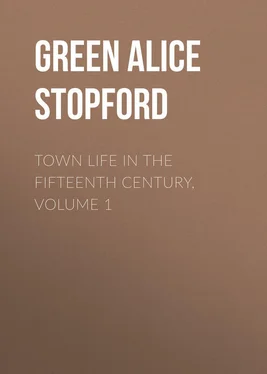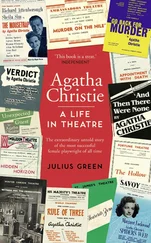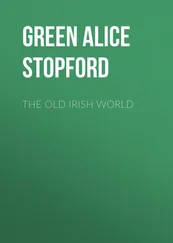Alice Green - Town Life in the Fifteenth Century, Volume 1
Здесь есть возможность читать онлайн «Alice Green - Town Life in the Fifteenth Century, Volume 1» — ознакомительный отрывок электронной книги совершенно бесплатно, а после прочтения отрывка купить полную версию. В некоторых случаях можно слушать аудио, скачать через торрент в формате fb2 и присутствует краткое содержание. Жанр: literature_19, foreign_antique, foreign_prose, Историческая проза, на английском языке. Описание произведения, (предисловие) а так же отзывы посетителей доступны на портале библиотеки ЛибКат.
- Название:Town Life in the Fifteenth Century, Volume 1
- Автор:
- Жанр:
- Год:неизвестен
- ISBN:нет данных
- Рейтинг книги:3 / 5. Голосов: 1
-
Избранное:Добавить в избранное
- Отзывы:
-
Ваша оценка:
- 60
- 1
- 2
- 3
- 4
- 5
Town Life in the Fifteenth Century, Volume 1: краткое содержание, описание и аннотация
Предлагаем к чтению аннотацию, описание, краткое содержание или предисловие (зависит от того, что написал сам автор книги «Town Life in the Fifteenth Century, Volume 1»). Если вы не нашли необходимую информацию о книге — напишите в комментариях, мы постараемся отыскать её.
Town Life in the Fifteenth Century, Volume 1 — читать онлайн ознакомительный отрывок
Ниже представлен текст книги, разбитый по страницам. Система сохранения места последней прочитанной страницы, позволяет с удобством читать онлайн бесплатно книгу «Town Life in the Fifteenth Century, Volume 1», без необходимости каждый раз заново искать на чём Вы остановились. Поставьте закладку, и сможете в любой момент перейти на страницу, на которой закончили чтение.
Интервал:
Закладка:
“Yea, quoth Patience, and hente out of his poke
A piece of the Pater Noster and proffered to us all.
And I listened and looked what livelihood it were;
Then was it ‘Fiat voluntas tua’ that should find us all.
‘Have, Actyf,’ quoth Patience, ‘and eat this when thee hungreth
Or when thou clomsest for cold or clyngest for drought;
And shall never gyves thee grieve nor great lord’s wrath,
Prison nor other pain for — patientes vincunt .” 24 24 Piers Ploughman, passus xvi. 248-255.
Such was Langland’s final solution for the disorders of his time. But the English were not a patient people, and the problem of the reorganization of society had become a very serious one towards the close of the Middle Ages, and was perhaps more urgent to men’s fears and consciences in the fifteenth century than it had ever been before, or was to be again till our own day. It was a pressing question for humble folk, for shopkeepers and traders and artisans and journeymen who in the absence of privilege were driven to think of liberty; and in the crowded lanes, the mean workshops, the disorderly market-place, the little thatched Common Hall of the mediæval town, great principles of freedom found their early home, and fought their way to perfection and supremacy. It was not enough that the burghers should create societies of free men – ” gentlemen ,” as Piers Ploughman would have said, 25 25 “The Jews that were gentlemen, Jesus they despised, Both his lore and his law, now are they low churls, As wide as the world is woneth (dwelleth) there none But under tribute and tallage as tikes and churls. And those that become Christian by counsel of the Baptist Are franklins and free… And gentlemen with Jesus.” (Piers Ploughman, ed. by W. Skeat for Early English Text Society, part iii.; pass. xxii. 34.) I have ventured to give quotations from mediæval writers in modern spelling, as I am here concerned neither with philology nor the history of literature: and there are many to whom the old methods of spelling only serve to obscure the sense.
to whom the great difference that distinguished between man and man was not wealth or poverty, labour or ease, but freedom or bondage. This was the easier part of their task, and was practically finished early in their history. It was a longer and more difficult business to discover how the art of government should be actually practised in these communities, and to define the principles of their political existence. But in these matters also the burghers became the pioneers of our liberties, and their political methods have been handed down as part of the heritage of the whole people. As by degrees the multitude of privileges promised and confirmed left the important towns with no more demands to make, they turned their energies to the work of framing those elaborate and highly artificial constitutions which mark the highest point to which their proud and self-sufficient independence had attained. Instead of tamely accepting the pattern or the theory of its neighbours, every town was making its own peculiar experiment in the art of governing, with a vivacity and a restless ingenuity proper to the culminating moment of their activity.
Meanwhile by a happy coincidence the boroughs were called to take part in the great movement by which the House of Commons was created, at a time when the discipline and experience of local self-government had prepared them to exercise a very real influence in the moulding of the English constitution into its present form. Having for the most part secured their fundamental liberties just before Simon de Montfort in 1265 summoned the middle class to take their share in the work of Parliament, and having steadily strengthened their position during all the thirty years of changing counsels and tentative experiments which followed, they saw the representation of the boroughs definitely established in 1295 – the very year after county representation had been at last perfectly acknowledged. 26 26 Stubbs, ii. 137-144, 239-244.
If for a time they played apparently a small part in political battles, if the separate action of the borough members is scarcely mentioned, 27 27 Ibid. ii. 560, 671.
the fact still remains that throughout the century during which the House of Commons was being fashioned 28 28 Stubbs, ii. 332-4.
members sent from these free self-governing communities formed almost two-thirds of that House. Edward the First sent Parliamentary writs to 166 towns, and in the Parliament of 1399, 176 representatives of boroughs sat by the seventy-four knights of the shire. 29 29 Ibid. ii. 257; iii. 16.
Silent and acquiescent as they were for a while, there are significant instances to show the steady growth of their importance, and the way in which statesmen had begun to appreciate the new force with which governments had henceforth to reckon. 30 30 The former devices for illegal taxation on the King’s part broke down when the commons looked so sharply after these matters that no attempt at unauthorised taxation of merchandise was made after the accession of Richard the Second. Stubbs, ii. 574-578. How completely the relation of King and commons had been reasoned out by the people we see in Langland’s writings. “Then came there a King, and ‘by his crown,’ said, ‘I am a king with crown the commons to rule, And holy Church and clergy from cursed men to defend. And if me lacketh to live by, the law wills that I take There I may have it hastelokest; (quickest) for I am head of law, And ye be both members, and I above all.’ ··········· ‘On condition,’ quoth conscience, ‘that thou conne defend And rule thy realm in reason right well, and in truth; Then, that thou have thine asking as the law asketh; Omnia sunt tua ad defendendum, sed non ad deprehendendum .’” (Piers Ploughman, passus xxii. 467-472, 478-481.)
By the close of the fourteenth century their influence was marked; and it was doubtless through its vigorous burghers that the House of Commons in the early part of the fifteenth century laid hold of powers which it had never had before, nor was to have again for two hundred years. 31 31 Stubbs, iii. 77; Rogers, Agric. and Prices, iv. viii.
In the list of petitions and statutes throughout the century in which their influence on legislation was plainly dominant, we may look for the true beginning of democratic government in England. 32 32 See the description of a session of Parliament in Richard the Redeless, passus iii. A.D. 1399.
Indeed at a yet earlier time, when the House of Commons was not seventy years old, its power had been already measured and men’s imaginations kindled by its mighty destiny. If supreme over all the King kept his state at Westminster,
“him lord antecedent,
Both their head and their King, holding with no party,
But stand as a stake that sticketh in a mire
Between two lands for a true mark”;
if his power was absolute, and he could
“claim the commons at his will
To follow him, to find him, and to fetch at them his counsel,” 33 33 Piers Ploughman, passus iv. 376, &c.
yet even then Conscience warned the sovereign that to frame a righteous government “without the commons’ help it is full hard, by my head”; 34 34 Ibid. passus v. 176.
and Reason
“counselled the King his commons to love,
For the commons is the King’s treasure.” 35 35 Ibid. passus vi. 181. M. Jusserand (Epopée Mystique du Moyen Age, 101-118), justly points out what a typical representative of common opinion Langland was. Compare the popular manifesto of 1450. (Hist. MSS. Com. viii. 267.) “They say the King should live upon his commons, and that their bodies and goods are his; the contrary is true, for then needed him never to set Parliament and to ask good of them.”
Интервал:
Закладка:
Похожие книги на «Town Life in the Fifteenth Century, Volume 1»
Представляем Вашему вниманию похожие книги на «Town Life in the Fifteenth Century, Volume 1» списком для выбора. Мы отобрали схожую по названию и смыслу литературу в надежде предоставить читателям больше вариантов отыскать новые, интересные, ещё непрочитанные произведения.
Обсуждение, отзывы о книге «Town Life in the Fifteenth Century, Volume 1» и просто собственные мнения читателей. Оставьте ваши комментарии, напишите, что Вы думаете о произведении, его смысле или главных героях. Укажите что конкретно понравилось, а что нет, и почему Вы так считаете.












